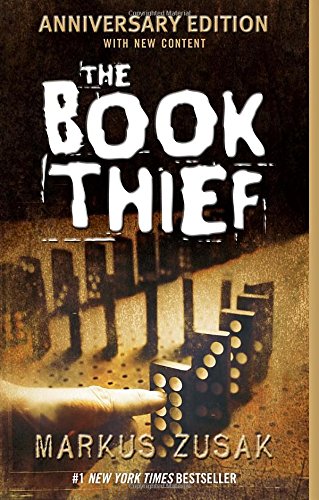All Nonfiction
- Bullying
- Books
- Academic
- Author Interviews
- Celebrity interviews
- College Articles
- College Essays
- Educator of the Year
- Heroes
- Interviews
- Memoir
- Personal Experience
- Sports
- Travel & Culture
All Opinions
- Bullying
- Current Events / Politics
- Discrimination
- Drugs / Alcohol / Smoking
- Entertainment / Celebrities
- Environment
- Love / Relationships
- Movies / Music / TV
- Pop Culture / Trends
- School / College
- Social Issues / Civics
- Spirituality / Religion
- Sports / Hobbies
All Hot Topics
- Bullying
- Community Service
- Environment
- Health
- Letters to the Editor
- Pride & Prejudice
- What Matters
- Back
Summer Guide
- Program Links
- Program Reviews
- Back
College Guide
- College Links
- College Reviews
- College Essays
- College Articles
- Back
The Book Thief by Markus Zusak
You lose your family in an instant. After being taken in by your foster parents, you then live in fear of being caught for helping someone. At any moment, soldiers could bang on your door, accusing you of treason. Welcome to the life of Liesel Meminger in Nazi Germany.
A #1 New York Times Bestseller, The Book Thief by Markus Zusak takes readers on an extraordinary journey into the lives of Liesel and her foster parents, Hans and Rosa Hubermann, during World War II. Surviving on meager rations and a small laundry business, Liesel adapts to living with a gentle, kind Papa and a hard but loving Mama. She makes friends, learns to read and write, and engages in stealing books, craving the power of words. Her flow of life soon changes, however, when Max, “the Jew,” knocks on the Hubermanns’ door in need of favor. He wants safety and Hans owes it to him.
Told from the viewpoint of Death, Zusak beautifully weaves Liesel’s encounters into those of Death’s. Though he had initially planned on using Liesel to narrate her own story, the author came to a realization. As he said in a 2007 interview with Cindy Hudson for motherdaugterbookclub.com, “I thought, ‘Aaaahhh, Death is afraid of us and haunted by us, because he is on hand to see all the terrible things we do to each other. It makes sense that he is telling the story to prove to himself that humans can be beautiful and selfless as well.’” With this in mind, he added a unique perspective seen in few publications. Splashes of the German language—“That Saukerl, that filthy pig—you call him Papa, verstehst? Understand?” Rosa explains to Liesel—also make this book original.
Through this historical fiction piece, readers get a sense of the many hardships during World War II. Zusak poetically illustrates the fear of hiding a Jew and the guilt and sorrow of living after leaving family behind. Shortly after her brother’s death, Liesel “...would always wake up swimming in her bed, screaming, and drowning in the flood of sheets. On the other side, the bed that was meant for her brother floated boatlike in the darkness.” By sharing nightmares though, Liesel breaks out of her quiet shell to speak to the starved Max. Soon readers are able to perceive the hope and will that comes along with life—from learning the value of words with Liesel and Max to performing acts of kindness with Hans. Though the Hubermanns have so little, they are ready to give so much even if it may put them in danger, an admirable trait during a time of struggle.
An Australian author, Markus Zusak’s inspirations come from the experiences of his parents. Zusak’s German mother was fostered and had a father who didn’t support the ideas of the Nazis, mirroring Liesel and Hans. Having lived through World War II, his parents witnessed many horrific scenes; one such was the whipping of a boy who gave bread to an old man being taken to a concentration camp, a memorable part of the book. These stories contributed to many scenes in the novel, ultimately giving the bigger picture of the lives of ordinary people amid warfare.
This touching story of a girl who learns the worth of words as she befriends a Jewish man during conflict is one that has won the hearts of many. Through the author’s flawlessly placed words, lovable characters, and interesting perspective, you will be captivated the moment you open to its first pages.
Bibliography
Zusak, Markus. The Book Thief. New York: Alfred A. Knopf, 2005.
Hudson, Cindy. "Interview with Markus Zusak, Author of The Book Thief and I Am the
Messenger." Mother Daughter Book Club. N.p., 24 Feb. 2010. Web. 26 Oct. 2016.
Similar Articles
JOIN THE DISCUSSION
This article has 0 comments.
